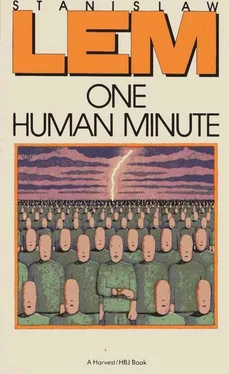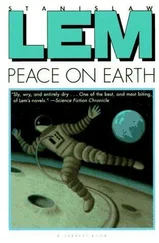In an elite German literary periodical I came across a review of One Human Minute written by an angry humanist. The book makes a monster out of mankind, he said, because it has built a mountain of meat from bodies, blood, and sweat (the measurements include, beyond excrement and menstrual bleeding, various kinds of sweat, since sweat from fear is different from sweat from hard work), but it has amputated the heads. One cannot equate the life of the mind with the number of books and newspapers that people read, or of the words they utter per minute (an astronomical number). Comparing theater-attendance and television-audience figures with the constants of death, ejaculation, etc., is not just misleading but a gross error. Neither orgasm nor death is exclusively and specifically human. What is more, they are largely physiological in character.
On the other hand, data that are specifically human, such as matters of intellect, are not exhausted, but neither are they explained by the size of the editions of philosophical journals or works. It is as if someone were to try to measure the heat of passion with a thermometer, or to put, under the heading “Acts,” both sex acts and acts of faith. This categorical chaos is no accident, for the authors’ intention was precisely to shock the reader with a satire made of statistics — to degrade us all under a hail of figures. To be a person means, first of all, to have a life of the spirit, and not an anatomy subject to addition, division, and multiplication. The very fact that the life of the spirit cannot be measured and put in statistical form refutes the authors’ claim to have produced a portrait of humanity. In this bookkeeper’s breakdown of billions of people into functional pieces to fit under headings, one sees the efficiency of a pathologist dissecting a corpse. Perhaps there is even malice. Indeed, among the thousands of index entries there is nothing at all resembling “human dignity."
Another critic also struck at the philosophical roots I mentioned. I have the impression (I say this parenthetically) that One Human Minute threw the intellectuals into confusion. They felt that they had the right to ignore such products of mass culture as the Guinness Book, but One Human Minute confounded them. For the Johnsons — whether they are cautious or only cunning — raised their work to a much higher level with a methodical, scholarly introduction. They anticipated many objections, citing contemporary thinkers who call truth the prime value in society. If that is so, then all truth, even the most depressing, is permissible and even necessary.
The critic-philosopher put his foot in the stirrup held by the Johnsons and mounted that high horse. First he praised them, then found fault with them. We have been treated — he wrote in Encounter — almost literally the way Dostoevsky feared in his Notes from Underground. Dostoevsky believed that we were threatened by scientifically proven determinism, which would toss the sovereignty of the individual — with its free will — onto the garbage heap when science became capable of predicting every decision and every emotion like the movements of a mechanical switch. He saw no alternative, no escape from the cruel predictability that would deprive us of our freedom, except madness. His Underground Man was prepared to lose his mind, so that, released by madness, it would not succumb to triumphant determinism.
But now that flimsy determinism of the nineteenth-century rationalists has collapsed and will rise no more; it was replaced, with unexpected success, by probability theory and statistics. The fates of individuals are as unpredictable as the paths of individual particles of gas, but from the great number of both emerge laws that pertain to all together, though the laws are not concerned with individual molecules or persons. After the fall of determinism, therefore, science executed a circling maneuver and attacked the Underground Man from another side.
Unfortunately, it is untrue that there is no hint of humanity’s spiritual life in One Human Minute. Locking up that life inside the head, so that it will manifest itself only in words, is an understandable habit of professional literati and other intellectuals, who constitute (the book informs us) a microscopic particle, a millionth, of humanity. The life of the spirit is displayed, by 99 percent of people, through actions that are measurable to the highest degree, and it would be a mistake to assume high-mindedly that psychopaths, murderers, and pimps have any less psyche than water carriers, merchants, and weavers.
So one cannot accuse the authors of misanthropy; at the most, one can point to the limitations inherent in their method. The originality of One Human Minute lies in its being not a statistical compilation of information about what has taken place, like an ordinary almanac, but rather synchronous with the human world, like a computer of the type that we say works in real time, a device tracking phenomena as they occur.
Having thus crowned the authors, the critic from Encounter proceeded to trim the laurels he had bestowed as he took up the Introduction. The demand for truth, which the Johnsons wave like a banner in order to defend One Human Minute against charges of obscenity, sounds fine but is unworkable in practice. The book does not contain “everything about the human being,” because that is impossible. The largest libraries in the world do not contain “everything.” The quantity of anthropological data discovered by scientists now exceeds any individual’s ability to assimilate it. The division of labor, including intellectual labor, begun thirty thousand years ago in the Paleolithic, has become an irreversible phenomenon, and there is nothing that can be done about it. Like it or not, we have placed our destiny in the hands of the experts. A politician is, after all, a kind of expert, if self-styled. Even the fact that competent experts must serve under politicians of mediocre intelligence and little foresight is a problem that we are stuck with, because the experts themselves cannot agree on any major world issue. A logocracy of quarreling experts might be no better than the rule of the mediocrities to which we are subject. The declining intellectual quality of political leadership is the result of the growing complexity of the world. Since no one, be he endowed with the highest wisdom, can grasp it in its entirety, it is those who are least bothered by this who strive for power. It is no accident that in the chapter on mental ability in One Human Minute there is no I.Q. information for eminent statesmen. Even the ubiquitous Johnsons were not able to subject those people to intelligence tests.
My view of this book is undramatic. One can approach it in a thousand ways, as this article shows. In my opinion, the book is neither a malicious satire nor the honest truth; not a caricature and not a mirror. The asymmetry of One Human Minute, its inclusion of incomparably more shameful human evil than manifestations of good, and more of the misery of our existence than its beauty, I attribute neither to the authors’ intention nor to their method. Only those who still cherish illusions on the subject of Man can be depressed by the book. The asymmetry of good and evil would probably even lend itself to a numerical comparison, though the Johnsons somehow did not think of it. The chapters on vice, felony, fraud, theft, blackmail, and computer crime [1] This involves the manipulation of this electronic extension of intellectual work to bring unlawful profits to the programmer. Recently it has expanded to include activities that, at the moment, are not recognized as crimes, on the principle of nullum crimen sine lege: it is not criminal to use the huge processing power of computers to increase one’s chances of winning the lottery or in gambling. A couple of mathematicians showed that you could break the bank in roulette by analyzing the movements of the ball, for no roulette wheel is completely random; that is, the wheel deviates from theoretical chance, and the deviation can be determined and exploited by computer.
are far more extensive than the chapters devoted to “good deeds.” The authors did not compare such numbers in one table, and that is a pity. It would have shown clearly how much more extensive evil is than good. Fewer are the ways of helping people than of harming them; it is the nature of things, not a consequence of the statistical method. Our world does not stand halfway between heaven and hell; it seems much closer to hell. Free of illusions in this respect — for some time now — I was not shocked by this book.
Читать дальше












